

Stress Test - How Stressed Are You? Untitled. The Upside of Stress. Stress. External sources of stress could include: Personal problemsWork problemsRelationship difficultiesPressure of studiesHealth problemsFinancial crisisUnemploymentLosses, e.g. bereavementUnexpected newsDaily hassles Internal sources of stress could include the following: Thinking stylesNegativity: "I'm useless, a loser, a failure.
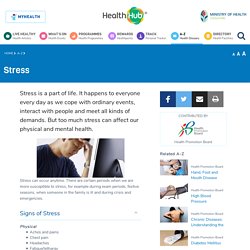
"Suspicion: "Why are they so nice to me? " Stress: Why does it happen and how can we manage it? Stress is a natural feeling of not being able to cope with specific demands and events. 3 Types of Stress and Health Hazards - Shawna Freshwater, PhD. Stress is a feeling that people have when they are struggling to cope with challenges related to finances, work, relationships, environment, and other situations.
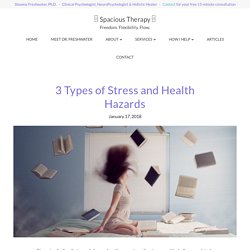
Moreover, stress is felt when an individual perceives a real or imagined challenge or threat to a their well-being. People often use the word stress interchangeably with anxiety, feeling anxious, fearful, nervous, overwhelmed, panic, or stressed-out. Stress is the body’s natural defense against real or imagined danger. It flushes the body with hormones to prepare systems to evade or confront danger. This is known as the “fight-or-flight or freeze” response. The body is an intelligent operating system, but the body can not determine the difference between life threatening external threat from imagined or perceived non-life threatening stressors. 6 Common Triggers of Teen Stress. SYRS final report. Stress effects on the body. Musculoskeletal system When the body is stressed, muscles tense up.
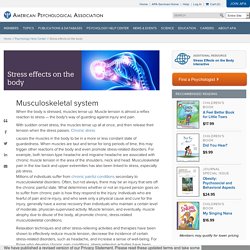
Muscle tension is almost a reflex reaction to stress — the body's way of guarding against injury and pain. With sudden onset stress, the muscles tense up all at once, and then release their tension when the stress passes. Chronic stress causes the muscles in the body to be in a more or less constant state of guardedness. Millions of individuals suffer from chronic painful conditions secondary to musculoskeletal disorders. Relaxation techniques and other stress-relieving activities and therapies have been shown to effectively reduce muscle tension, decrease the incidence of certain stress-related disorders, such as headache, and increase a sense of well-being.
Respiratory system The respiratory system supplies oxygen to cells and removes carbon dioxide waste from the body. Some studies show that an acute stress — such as the death of a loved one — can actually trigger asthma attacks. Cardiovascular Endocrine The HPA axis. Under pressure at home and in school, youths battle depression. SINGAPORE: Even in preschool, Jodee Kua was picked on “quite a bit” by her classmates.
And it did not take much, like stealing her seat or making fun of her, to make her burst into tears. “It was easy to just push that button,” said Ms Kua, now 21. “Once, I had some chee cheong fun sauce on my face, and it became a joke to the whole class. So I cried.” In primary school, she had self-esteem issues. “I didn’t know there was such a thing as depression. Studies suggest that depression – the most common mental illness in Singapore – may affect up to 18 per cent of youths here. In the documentary Facing Depression, three young Singaporeans opened up about how they found coping with adolescent life difficult, and their struggles with depression, anxiety and self-harming behaviour.
This is because of the great amount of time a child spends in both environments, explained senior clinical psychologist Wong Hui Yi, from the Institute of Mental Health’s department of child and adolescent psychiatry. Stress Management Techniques. By Saul McLeod, published 2015 Stress arises when individuals perceive a discrepancy between the physical or psychological demands of a situation and the resources of his or her biological, psychological or social systems (Sarafino, 2012).
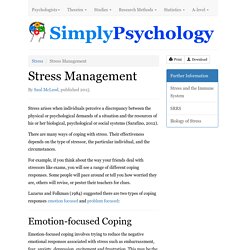
There are many ways of coping with stress. Their effectiveness depends on the type of stressor, the particular individual, and the circumstances. For example, if you think about the way your friends deal with stressors like exams, you will see a range of different coping responses. Some people will pace around or tell you how worried they are, others will revise, or pester their teachers for clues. Lazarus and Folkman (1984) suggested there are two types of coping responses emotion focused and problem focused: Emotion-focused Coping.
Coping with Stress. The most dangerous aspect of stress is how easily it can creep up on you.
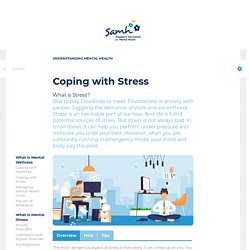
You think that you got used to it. It may start to feel familiar, or even normal. You may not notice how much it is affecting you, even as it exacts a heavy toll. If you often feel frazzled and overwhelmed, it is time to take action to bring your emotional and physical health back on track. Stress management starts with identifying the sources of stress in your life. Common external sources of stress Major changes in life Work pressuresRelationship difficultiesFinancial problemsBeing too busyCommon internal sources of stress Inability to accept uncertaintyPessimismNegative self-talkUnrealistic expectationsPerfectionismLack of assertiveness. Untitled. Untitled. Untitled. Four Ways to Calm Your Mind in Stressful Times. Life throws chaos at us on a regular basis—whether it’s our finances, our relationships, or our health.

In the work world, around 50 percent of people are burned out in industries like health care, banking, and nonprofits, and employers spend $300 billion per year on workplace-related stress. This essay is adapted from Emma Seppälä's talk "Building Resilience in Times of Chaos. " In response, we just keep on pushing through, surviving on adrenaline. We overschedule ourselves; we drink another coffee; we respond to one more email. If we stay amped up all the time, we think, we’ll eventually be able to get things done. But all that does is burn us out, drain our productivity, and lead to exhaustion. There’s another way—a calmer way. A stressed mind vs. a calm mind Stress was never meant to be a 24/7 experience.
That stress response is supposed to be short-lived because it wears down your body, your health, and your energy. You also perceive the world differently. 1.